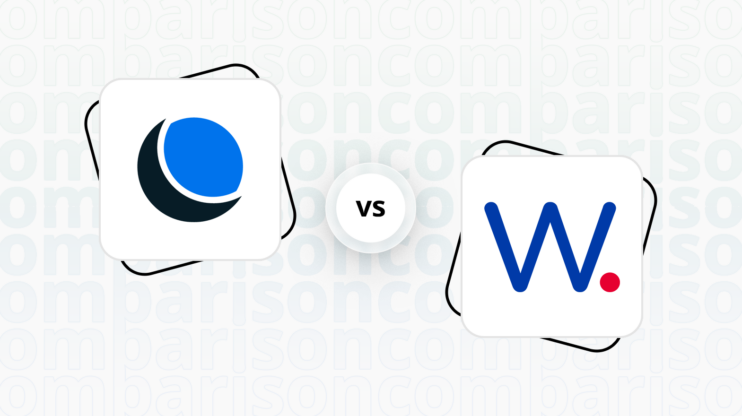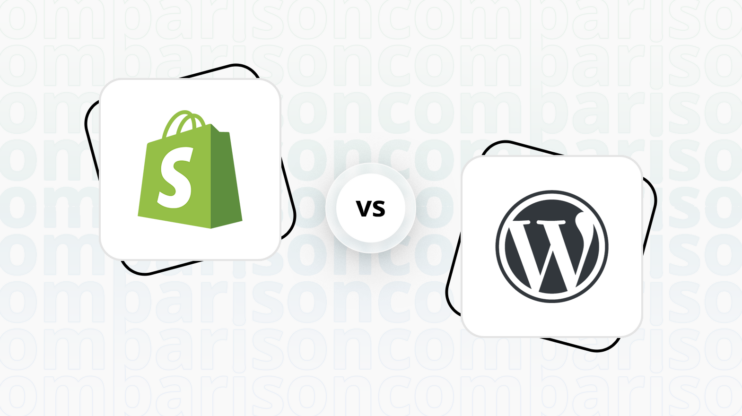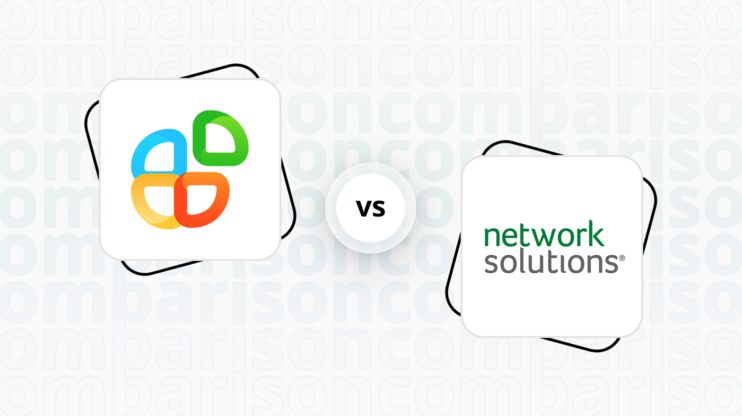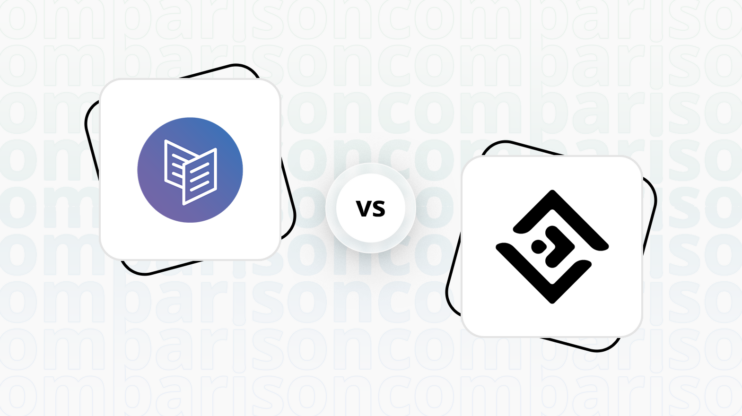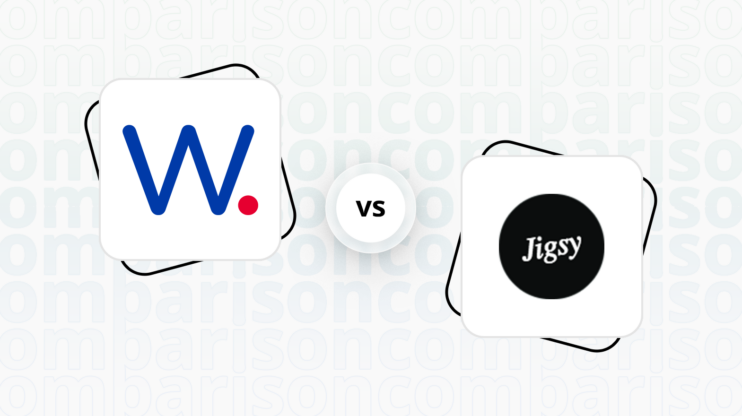Final verdict
Sellfy and Jimdo both offer unique advantages, but they cater to different user needs and preferences.
-
Sellfy (Overall Grade: 6.0/10)
is an all-in-one eCommerce platform tailored for creators looking to sell a wide array of products, including digital, physical, subscription-based, and print-on-demand items. It offers a simple, user-friendly interface that allows for quick setup of an online store without necessitating advanced technical skills. Sellfy excels in providing a comprehensive set of tools to manage, market, and scale an online business effectively. However, it lacks advanced design flexibility and AI capabilities, which may limit its appeal to users seeking more customization and automation. -
Jimdo (Overall Grade: 7.2/10)
is a user-friendly website builder platform designed for a wide range of users, from individuals creating personal blogs or portfolios to small businesses and ecommerce entrepreneurs. Jimdo stands out with its simplicity and ease of use, especially beneficial for those with basic computer skills or limited time. It offers a diverse range of templates, greater customization flexibility, and AI-driven website creation tools. Jimdo also provides strong security features, comprehensive customer support, and a wide range of plugins and integrations, making it a versatile choice for various website needs.

|

|
|
|---|---|---|
|
Design functionalities & templates |
5.2 |
7.2 |
|
Ease of use |
7.8 |
8.0 |
|
Ecommerce |
6.8 |
7.0 |
|
Website Editors |
6.8 |
7.8 |
|
Product testing options |
7.3 |
6.4 |
|
Price |
7.9 |
7.5 |
|
Hosting quality |
7.3 |
6.7 |
|
Website speed optimization |
5.4 |
7.6 |
|
Plugins and integrations |
6.7 |
7.4 |
|
Marketing features |
7.1 |
7.2 |
|
Customer support |
5.8 |
6.8 |
|
Security |
7.2 |
8.3 |
|
AI capabilities |
0 |
6.0 |
|
User Management |
2.0 |
5.8 |
Best for ecommerce
 6.8
6.8
 7.0
7.0
Verdict
: Sellfy and Jimdo both offer solid ecommerce capabilities, but they cater to different user needs. Sellfy is tailored for creators looking to sell a wide array of products, while Jimdo is designed for a broader range of users, including small businesses and ecommerce entrepreneurs.
-
Sellfy
: Sellfy is an all-in-one ecommerce platform ideal for creators selling digital, physical, subscription-based, and print-on-demand items. It offers a simple, user-friendly interface that allows for quick setup of an online store without advanced technical skills. Sellfy’s focus on simplifying the ecommerce process makes it a great choice for creators looking to manage, market, and scale their online business effectively. Best for ecommerce score: 6.8. -
Jimdo
: Jimdo is a user-friendly website builder platform designed for a wide range of users, from individuals creating personal blogs or portfolios to small businesses and ecommerce entrepreneurs. It stands out with its simplicity and ease of use, especially beneficial for those with basic computer skills or limited time. Jimdo offers a comprehensive set of ecommerce features, including product details and variations, inventory tracking, and no transaction fees. Best for ecommerce score: 7.0.
Best for informational & business websites
 5.7
5.7
 7.4
7.4
Verdict
: Jimdo is the superior choice for informational business websites, offering a more user-friendly experience and greater design flexibility compared to Sellfy.
-
Sellfy
: While Sellfy excels as an eCommerce platform for creators, it falls short in providing the necessary tools and flexibility for creating comprehensive informational business websites. Its focus on simplicity and eCommerce functionalities makes it less suitable for users looking to build detailed and highly customizable informational sites. Best for Informational Business Websites score: 5.7. -
Jimdo
: Jimdo stands out with its user-friendly interface and diverse range of templates, making it ideal for creating and managing informational business websites. Its AI-driven website builder, Jimdo Dolphin, simplifies the design process, while Jimdo Creator offers more customization options for advanced users. This flexibility, combined with strong customer support and security features, makes Jimdo a better fit for informational sites. Best for Informational Business Websites score: 7.4.
Detailed comparison
Design functionalities & templates
Design FunctionalitiesRepresents how well each platform allows for creative design and customization of websites.Score Components:
- Template Variety (30%): Range and quality of design templates.
- Customization (30%): Flexibility and options for design alterations.
- User Interface (20%): Ease and intuitiveness of the design process.
- Responsiveness (10%): Adaptability to different devices and screen sizes.
- Innovation (10%): Unique design features and tools.
 5.2
5.2
 7.2
7.2
🏆
Winner: Jimdo.
Jimdo offers a more diverse range of templates and greater customization flexibility, making it the preferred choice for users seeking detailed personalization.
Sellfy provides a collection of design templates through its theme store, located in the Store Customizer. Users have the option to preview these themes before applying them to their websites. As of the latest information, Sellfy offers five main theme options: Lumiére, Noir, Savant, Idée, and Mode. These themes cater to various aesthetic preferences and can be published to go live on a user’s website after selection and customization.
On the other hand, Jimdo offers a diverse range of templates suitable for various industries and user preferences, with options to preview and select templates easily. The platform allows flexibility in changing templates for existing websites and also provides a “Blank Template” for custom designs, catering to both beginners and advanced users.


Get a head start on website creation with AI
Create a custom website tailored to your business needs 10X faster with 10Web AI Website Builder!
Ease of use
Ease of useReflects the platform’s overall user-friendliness.Score
Components:
- Learning curve (40%): Quickness and ease of getting started.
- Interface design (30%): Simplicity and intuitiveness of layout.
- User guidance (20%): Quality of tutorials and support.
- Flexibility (10%): Adaptability to various user skills.
 7.8
7.8
 8.0
8.0
🏆 Winner: Jimdo
. With a score of 8.0, Jimdo edges out Sellfy (7.8) in terms of ease of use. Jimdo’s AI-driven website builder, Jimdo Dolphin, simplifies the design process, making it particularly user-friendly for beginners. Sellfy, while offering an intuitive user interface and a straightforward website builder, may not satisfy those seeking advanced design flexibility.
Learning Resources
🏆 Winner: Jimdo
. Jimdo offers user-friendly learning resources and tools that cater to both beginners and those with some experience in website design. Sellfy, on the other hand, lacks a large community of users and does not have a community forum, which can be a valuable resource for learning and troubleshooting.
For ecommerce
EcommerceMeasures the platform’s effectiveness in supporting online business activities.Score Components:
- Ecommerce themes and templates (20%): Variety and design of templates.
- Product management (25%): Ease of managing and organizing products.
- Payment options (25%): Variety and convenience of payment methods.
- Ecommerce features (20%): Features for managing an ecommerce store.
- Integration (10%): Compatibility with external e-commerce tools and services.
 6.8
6.8
 7.0
7.0
Sellfy and Jimdo both offer ecommerce capabilities, but they cater to different user needs. Sellfy is tailored for creators looking to sell a wide array of products, including digital, physical, subscription-based, and print-on-demand items. On the other hand, Jimdo is designed for a wide range of users, including small businesses and ecommerce entrepreneurs.

|

|
|
|---|---|---|
|
Ecommerce themes and templates |
7.0 |
6.5 |
|
Product page customization |
6.5 |
6.8 |
|
Payment processing and commissions |
8.0 |
7.5 |
|
POS capabilities |
4.0 |
5.0 |
|
Payment gateways |
6.0 |
7.0 |
|
Product numbers |
7.5 |
6.0 |
|
Additional ecommerce features |
6.5 |
6.5 |
Sellfy ecommerce features:
- Product Listings
- Payment Gateways integration
- Product categories
Jimdo ecommerce features:
- Product details and variations
- Inventory tracking
- No transaction fees
- Discount codes and promotions
- Email marketing
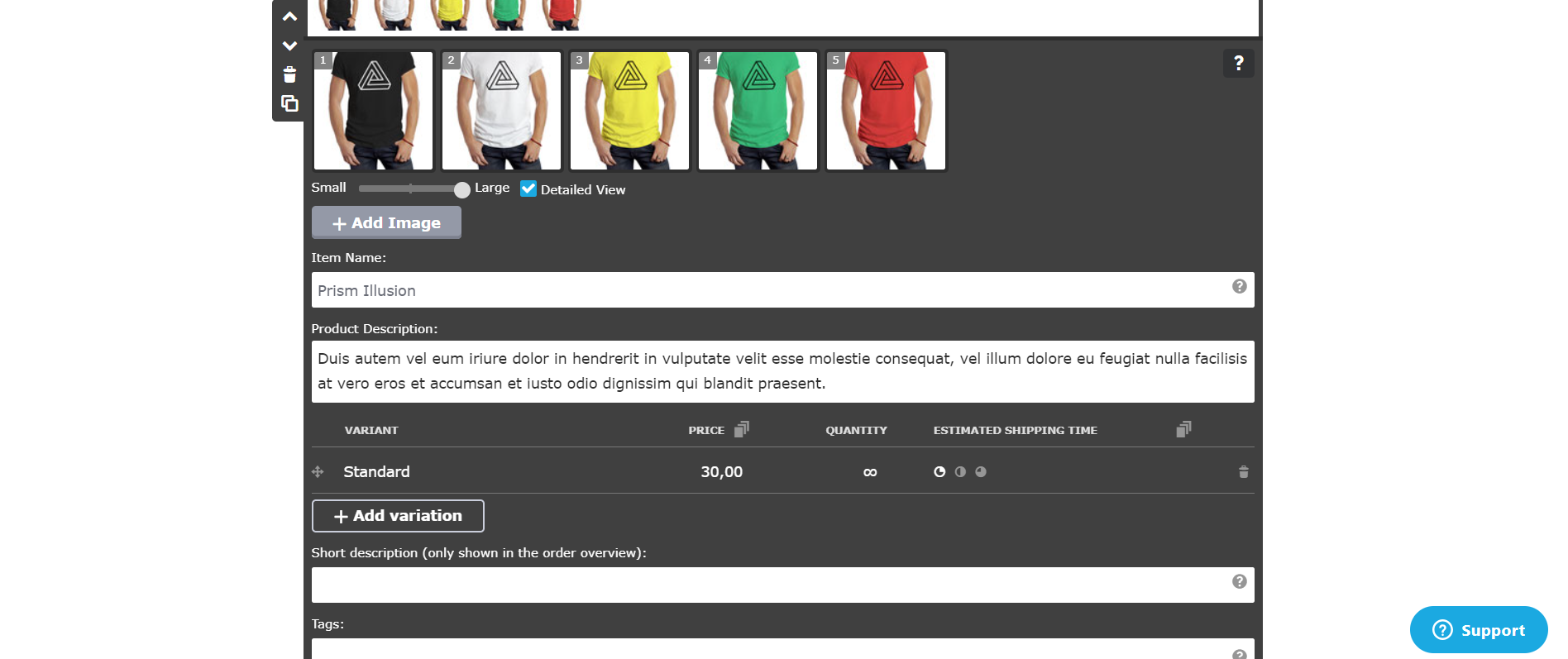
Ecommerce themes & templates
Sellfy offers templates designed specifically for online stores. In contrast, Jimdo’s ecommerce templates offer a diverse range of pre-designed themes, ensuring a mobile-friendly and smooth shopping experience. The drag-and-drop interface allows for easy customization of colors, fonts, and layouts, while templates focus on showcasing products with dedicated sections for images, descriptions, and clear calls to action.
Product page customization
Sellfy supports a diverse range of products including digital goods like music, videos, ebooks, and software, as well as physical products and print-on-demand merchandise such as t-shirts and mugs. The platform enables the sale of subscriptions, offering a means for recurring revenue. Sellfy provides tools for product protection and piracy prevention, ensuring secure file hosting and delivery.
On the other hand, customizing a product page on Jimdo involves using its user-friendly interface to personalize various elements. You can edit text, add images, adjust layouts, and modify design elements like colors and fonts to showcase your products effectively. Jimdo also offers additional features such as SEO tools and mobile responsiveness to ensure your product page performs well across different devices and search engines.
Payment processing
When it comes to payment processing, Sellfy supports two primary payment gateways, Stripe and PayPal, allowing for various payment options including credit/debit cards and localized payment methods in Europe. The platform does not charge transaction fees beyond its subscription cost, though payment processors’ standard fees apply.
Jimdo facilitates payment processing through various popular gateways like PayPal, Stripe, Mollie, and more, depending on your location and plan. While Jimdo doesn’t impose transaction fees, individual payment gateways may have their own charges, typically ranging from 2% to 3% of the transaction amount plus a fixed fee. Additionally, certain Jimdo plans may offer free transactions per month, providing flexibility for users based on their plan details.
Website Editors
Website EditorsEvaluates the platforms’ website building and editing capabilities.Score Components:
- Customization tools (40%): Range and power of editing features.
- Editor usability (30%): User experience within the editor.
- Design flexibility (20%): Freedom in layout and design changes.
- Update and maintenance ease (10%): Simplicity of updating and maintaining the site.
 6.8
6.8
 7.8
7.8
🏆
Winner: Jimdo
. Jimdo, with a score of 7.8, offers two main modes: Jimdo Dolphin and Jimdo Creator. Dolphin, an AI-driven tool, is ideal for beginners and creates websites based on user responses to a series of questions, streamlining the web design process. On the other hand, Jimdo Creator provides a more traditional website building experience with greater customization options, including a drag-and-drop editor and HTML widgets, catering to users seeking more control over their site’s design.
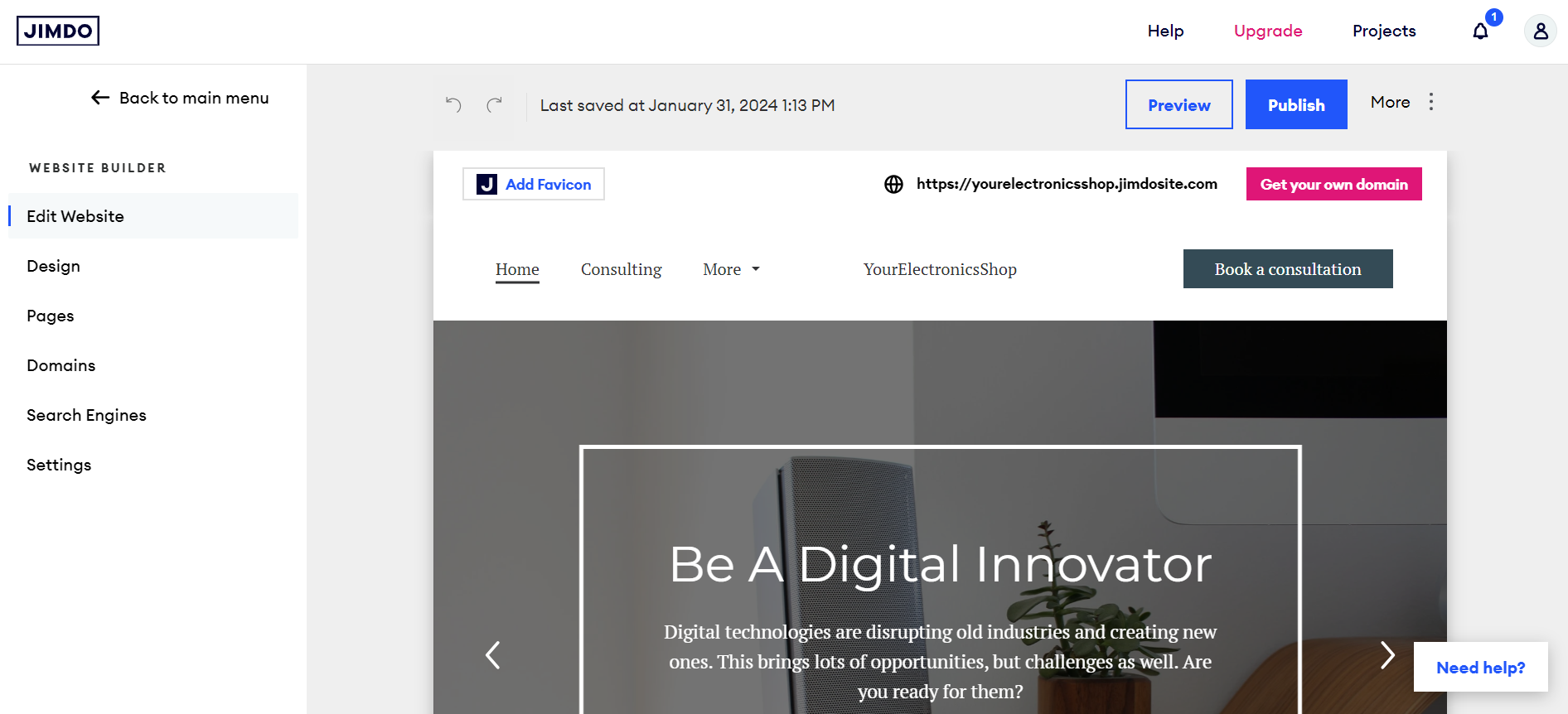
Sellfy’s website builder, scoring 6.8, offers a straightforward and user-friendly platform for creating online stores, focusing on simplicity over advanced customization. It supports the sale of digital, physical, subscription-based, and print-on-demand products, alongside integrated marketing tools for promotion and sales optimization. Despite some limitations in design customization and app integrations, Sellfy aims to provide a comprehensive e-commerce solution for entrepreneurs and creators.
Mobile editor/app
 7.5
7.5
 8.0
8.0
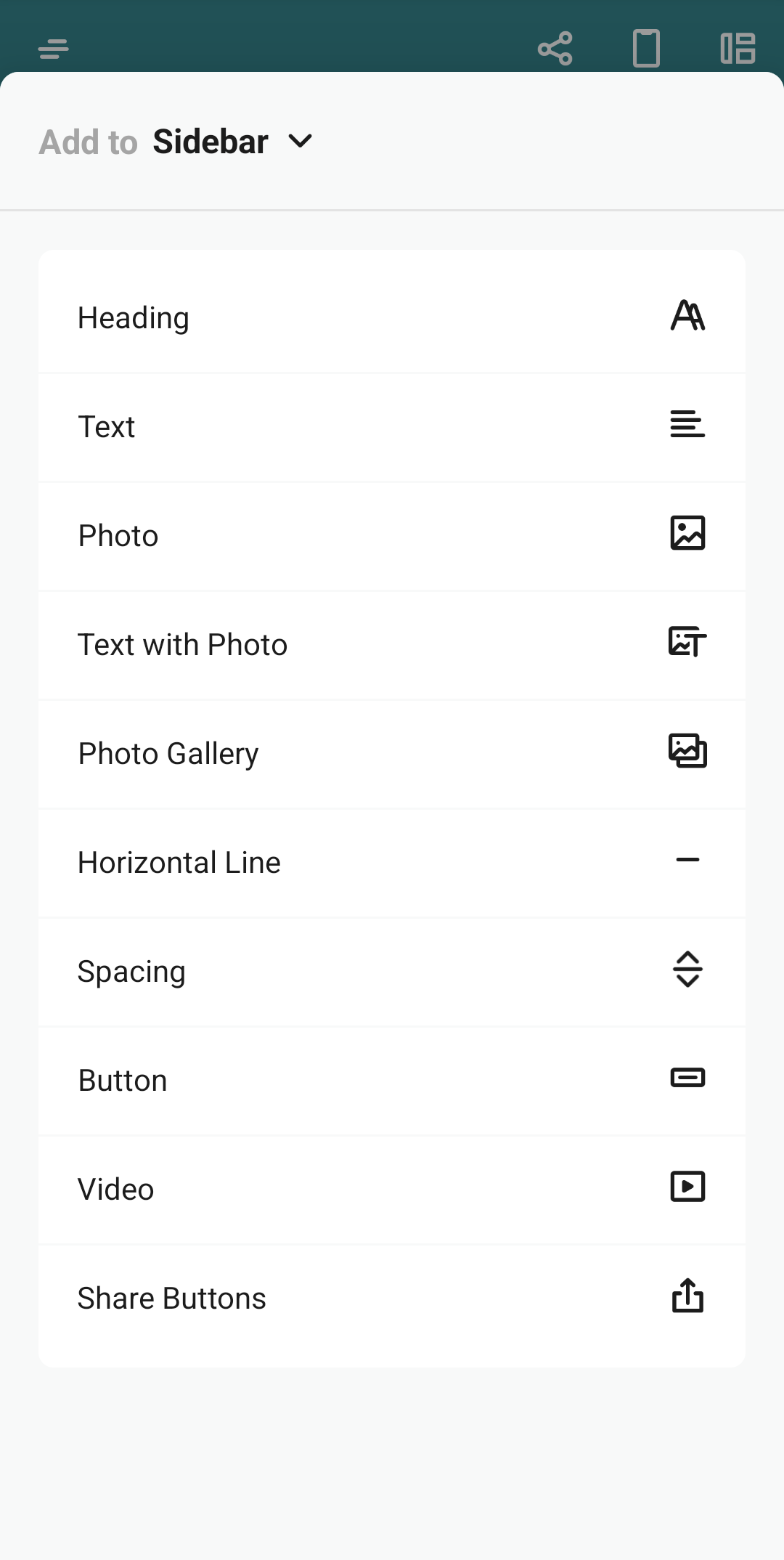
🏆
Winner: Jimdo
. Both Sellfy and Jimdo offer mobile apps for managing your website, but they cater to different needs and skill levels. Sellfy’s mobile app is designed for managing online stores, offering functionalities such as viewing store performance metrics, managing and tracking orders, and receiving customized notifications. However, it does not allow users to change the layout or the design of the website itself.
Jimdo, on the other hand, allows users to create and manage their websites directly from their smartphones or tablets. This includes adding or modifying content, adjusting design elements, and managing their online store. This makes Jimdo’s mobile app more versatile and user-friendly, earning it a higher score in this category.
In summary, Jimdo receives a higher rating due to its versatility in general website editing and a more beginner-friendly interface, while Sellfy is strong in ecommerce management but may be better suited for users with some experience.
Product testing options
Product Testing OptionsAssesses the options for trying out platform features before commitment.Score Components:
- Trial quality (40%): Extent and usefulness of the trial or free version.
- Feature accessibility (30%): How many features are available to test.
- Trial duration (20%): Length of the trial period.
- Ease of transition (10%): Smoothness of moving from trial to paid plans.
 7.3
7.3
 6.4
6.4
Overall Result
:
Sellfy Wins
. Sellfy scores 7.3 in product testing options, slightly higher than Jimdo’s 6.4. Sellfy offers a 14-day free trial during which all premium features can be tested, while Jimdo only allows basic feature exploration in its free plan. For more advanced options, Jimdo users need to subscribe to a paid plan, but they do offer a 14-day money-back guarantee. Sellfy also offers a longer money-back guarantee period of 30 days.

|

|
|
|---|---|---|
|
Free Plan |
No (14-day free trial) | Yes (Basic features only) |
|
Trial Duration |
14 days | No (14-day money-back guarantee) |
|
Testing Premium Features |
During the free trial |
With paid plans |
|
Money-Back Guarantee |
30 days |
14 days |
Price
PriceLooks at the cost-effectiveness and value for money of each platform.Score Components:
- Plan value (40%): What each pricing tier offers.
- Transparency and clarity (30%): Clearness of pricing structures.
- Flexibility of plans (20%): Range of options to suit different budgets.
- Hidden costs (10%): Additional expenses not included in the plan.
 7.9
7.9
 7.5
7.5
Sellfy and Jimdo have similar pricing structures, but Sellfy scores slightly higher in terms of price.
Neither platform offers an enterprise plan. Both platforms offer discounts for annual billing, with Sellfy offering a 20% discount and Jimdo offering discounts ranging from 20% to 25% depending on the plan.

|

|
|
|---|---|---|
|
Free |
No offering at this amount. |
Play ($0/month): Basic, entry-level plan offering limited features, ideal for testing Jimdo’s capabilities. Includes 500MB storage and up to 5 website pages. Limited ecommerce functionality. |
|
$0-$10 |
No offering at this amount. |
Start ($9/month): Aimed at small projects or businesses just starting out. Provides 5GB of storage and up to 10 website pages, along with SEO tools for online visibility. Not directly focused on ecommerce. Value for price: 6.0 |
|
$10-$15 |
No offering at this amount. |
Grow ($15/month): Targets growing businesses needing more space and features. Offers more flexibility but still lacks dedicated ecommerce capabilities compared to the Business plan. Provides 20GB bandwidth with up to 50 website pages. Value for price: 7.0 Basic ($15/month): Up to five forwarding email addresses, up to 10 website pages, convenient payment methods. Value for price: 6.5 |
|
$15-$20 |
No offering at this amount. |
Business ($19/month): Designed for small to medium-sized online stores, offering ecommerce features without transaction fees. Includes selling on Facebook and Instagram, and various payment options. And up to 50 website pages. Value for price: 8.0 |
|
$20-$40 |
Starter ($29/month): Ideal for growing businesses with sales up to $10k/year. Offers unlimited products, digital and subscription products, domain connection, and 2,000 email credits. Annual savings available. Value for price: 7.5 |
VIP ($39/month): Provides comprehensive features for large or expanding online stores, including unlimited storage and priority support and unlimited website pages. Includes professional design review and no transaction fees. Value for price: 9.0 Unlimited ($39/month): Offers unlimited bandwidth and storage, up to 20 forwarding email addresses and unlimited website pages. Includes priority support and professional design reviews. Value for price: 9.5 |
|
$70-$80 |
Business ($79/month): Targets businesses with up to $50k in yearly sales, offering everything in the Starter plan plus 10,000 email credits, product and store design migration, product upselling, cart abandonment tools, and Sellfy branding removal. Value for price: 8.0 |
No offering at this amount. |
|
$100+ |
Premium ($159/month): For businesses with up to $200k/year in sales. Includes everything in the Business plan plus 50,000 email credits, product migration, and priority support. Annual savings are also offered. Value for price: 8.5 |
No offering at this amount. |
location. As a result in rare cases the prices displayed here can differ from the ones you see on their
websites.
Hosting quality
Hosting
qualityExamines the reliability and performance of the hosting solutions.Score Components:
- Uptime (40%): Consistency and reliability of website availability.
- Speed (30%): Loading times and performance.
- Bandwidth and storage (20%): Sufficiency of resources provided.
- Data centers (10%): Quality and distribution of hosting infrastructure.
 7.3
7.3
 6.7
6.7
🏆
Winner: Sellfy
Sellfy edges out Jimdo with a slightly higher hosting quality score. Both platforms offer hosting services, but Sellfy boasts a higher uptime of 99.99%, compared to Jimdo’s 99.5%. However, neither platform provides an uptime guarantee. Sellfy does not disclose its hosting type or data center locations, while Jimdo offers shared, cloud, and managed hosting, with data centers spread across multiple regions.

|

|
|
|---|---|---|
|
Do they offer hosting? |
Yes |
Yes |
|
Data Centers: |
Not disclosed |
Multiple regions |
|
Type of hosting: |
Not disclosed |
Shared, Cloud, Managed |
|
Uptime: |
99.99% |
99.5% |
|
Uptime Guarantee: |
No |
No |
Website Speed Optimization
Website Speed OptimizationEvaluates optimization of website loading timesScore Components:
- PageSpeed Score (30%): Google’s score indicating performance optimization.
- Loading Time (30%): The average time until a website is fully interactive.
- Mobile Optimization (15%): Optimization effectiveness for mobile devices.
- Resource Optimization (15%): Optimizing images, scripts, and other heavy resources.
- CDN Usage (10%): Use of CDN to enhance speed across geolocations.
 5.4
5.4
 7.6
7.6
🏆 Winner: Jimdo
Both Sellfy and Jimdo prioritize website performance and page speed, but Jimdo has a more comprehensive approach to speed optimization, which gives it an edge over Sellfy.

|

|
|
|---|---|---|
|
Focus |
Code Minification, Caching, Image Optimization |
Content Optimization, CDN, Image optimization, Caching, Mobile Responsive design |
|
Performance Tools |
Not specified |
Not specified |
|
Key Strategies |
Code Minification, Caching, Image Optimization |
Content Optimization, CDN, Image optimization, Caching, Mobile Responsive design |
|
Load Times |
Varies depending on optimization and website complexity |
Varies widely, dependent on optimization |
|
Page Speed Scores Range |
Not specified |
Scores vary; influenced by plugins, images |
|
Core Web Vitals Improvement |
Not specified |
Optimizing LCP, Enhancing FID, Improving CLS |
Jimdo’s approach to enhancing site speed includes content optimization, use of content distribution networks (CDN), image optimization, caching, and mobile responsive design. These strategies help to improve the load times and PageSpeed scores of websites built with Jimdo. In addition, Jimdo is focused on improving Core Web Vitals by optimizing the Largest Contentful Paint (LCP), enhancing the First Input Delay (FID), and improving the Cumulative Layout Shift (CLS).
On the other hand, Sellfy’s strategies for speed optimization include code minification, caching, and image optimization. However, Sellfy does not provide any specific information on their load times, PageSpeed scores, or Core Web Vitals improvements. This lack of transparency makes it difficult to assess the effectiveness of Sellfy’s speed optimization strategies. Therefore, Jimdo is the winner in this category.
Get a head start on website creation with AI
Create a custom website tailored to your business needs 10X faster with 10Web AI Website Builder!
Plugins and integrations
Plugins and integrationsMeasures the range and effectiveness of additional plugins and integrations.Score Components:
- Variety of options (40%): Range of available add-ons.
- Integration smoothness (30%): Ease of integrating plugins into the site.
- Quality of plugins (20%): Functionality and reliability of the options.
- Custom integration capabilities (10%): Support for custom or third-party integrations.
 6.7
6.7
 7.4
7.4
🏆 Winner: Jimdo.
Jimdo scores 7.4, slightly ahead of Sellfy’s 6.7. Jimdo offers a range of plugins and extensions, with POWr and Elfsight being major providers. These tools enhance website functionality and cater to diverse business and marketing needs. On the other hand, Sellfy offers various integrations for its website builder, including Google Analytics, Facebook Live Chat, Zapier, and social media advertising tools, to enhance ecommerce functionality and automate workflows. However, Jimdo’s wider range of plugins and extensions gives it the edge in this category.
Marketing Features
Design FunctionalitiesRepresents how well each platform allows for creative design and customization of websites.Score Components:
- Template Variety (30%): Range and quality of design templates.
- Customization (30%): Flexibility and options for design alterations.
- User Interface (20%): Ease and intuitiveness of the design process.
- Responsiveness (10%): Adaptability to different devices and screen sizes.
- Innovation (10%): Unique design features and tools.
 7.1
7.1
 7.2
7.2
🏆
Overall Winner: Jimdo
. Jimdo edges out Sellfy by a small margin, mainly due to its blogging feature which Sellfy lacks. Both platforms offer a range of marketing tools, but Jimdo’s comprehensive blogging feature gives it a slight advantage.

|

|
|
|---|---|---|
|
SEO Tools |
|
|
|
Email Marketing |
|
|
|
Blogging |
|
|
|
Social Media Integration |
|
|
|
Analytics and Reporting |
|
|
|
Ads and Promotions |
|
|
Customer Support
Customer supportEvaluates the quality and availability of support options.Score Components:
- Response time (40%): Speed of support responses.
- Support quality (30%): Effectiveness and helpfulness of the support.
- Availability (20%): Range of support channels (phone, chat, email).
- Resource richness (10%): Quality of self-help and educational materials.
 5.8
5.8
 6.8
6.8
🏆 Winner: Jimdo
. In the comparison of Sellfy vs Jimdo, Jimdo takes the lead with a customer support score of 6.8 compared to Sellfy’s 5.8. Jimdo offers a variety of support channels, including email, a call center, and social media support, which provides users with multiple ways to get assistance. Although live chat is not available, the comprehensive knowledge base and specific request forms for common issues enhance the support experience.
Sellfy, on the other hand, provides 24/7 support but lacks phone and live chat options, limiting users to email and possibly a knowledge base for self-service. While this ensures that help is available at any time, the limited support channels may not be sufficient for users needing immediate assistance. Therefore, Jimdo’s broader range of support options makes it the better choice for customer support.
Security
SecurityLooks at the platforms’ security measures and data protection.Score Components:
- Data protection (40%): Safeguards for user and customer data.
- SSL and encryption (30%): Implementation of secure connections.
- Compliance (20%): Adherence to industry security standards.
- Regular updates (10%): Frequency of security updates and patches.
 7.2
7.2
 8.3
8.3
🏆
Winner: Jimdo
. Jimdo takes a comprehensive approach to security, with a strong firewall, DDoS protection, HTTPS encryption for all traffic, and SSL certificates for domains. They also ensure GDPR compliance and maintain a dedicated team for legal and information security.
On the other hand, Sellfy focuses on the security of digital products and transactions, with secure payment processors, unique download links for each purchase, and limited download attempts. However, it does not offer the same level of comprehensive security measures as Jimdo.
AI Capabilities
AI capabilitiesMeasures the effectiveness of AI-driven features and tools.Score Components:
- Automation efficiency (40%): Impact of AI on streamlining processes.
- Personalization (30%): AI-driven customization for users or customers.
- AI-Assisted design (20%): Role of AI in website design and functionality.
- Data analysis (10%): Use of AI in interpreting user data and analytics.
 0
0
 6.0
6.0

|

|
|
|---|---|---|
|
AI Builder |
|
Jimdo’s AI builder offers mobile-friendly designs, access to copyright-free images, ecommerce capabilities, a legal text generator, social media integrations, personalized domains, and custom logo creation |
|
AI Ecommerce features |
|
Jimdo’s AI provides basic functionalities like design suggestions for store layouts and image recommendations |
|
AI content generation |
|
|
🏆 Winner: Jimdo
. Jimdo, with a score of 6.0, offers basic AI capabilities that assist in website creation. Although it doesn’t have a dedicated content generation feature, its AI-driven website creation process simplifies the site-building journey.

On the other hand, Sellfy does not have any AI capabilities. This means that while it may offer a user-friendly interface and a comprehensive set of tools for managing, marketing, and scaling an online business, it lacks the advanced AI features that can further enhance the user experience.
User Management
User ManagementAssesses the platforms’ capabilities in managing user roles, permissions, and accessibility.Score Components:
- Role Customization (40%): Flexibility in creating and defining user roles and
permissions. - Ease of Management (30%): User interface and tools for managing users.
- Access Control (20%): Effectiveness of access control measures for different user
levels. - Scalability (10%): Ability to manage a growing number of users efficiently.
 2.0
2.0
 5.8
5.8
🏆 Winner: Jimdo
. The user management capabilities of Sellfy and Jimdo are quite different.
- Sellfy does not support adding multiple users or staff to a single account. This limits its user management capabilities and may not be suitable for larger teams or businesses that require multiple people to manage the website.
- Jimdo, on the other hand, offers different plans with varying levels of user management capabilities. The Free, Start, and Basic Shop Plans allow website management by a single owner. The Grow Shop Plan permits two editors, including the account owner and one collaborator. The Business Plan extends collaboration to five editors, consisting of the account owner and four collaborators. The Unlimited Plan provides unlimited editors, fostering a collaborative team environment. The VIP Plan, designed for online stores, does not specify a limit on editors for websites.
This makes Jimdo a more flexible option for teams of different sizes and requirements.
Additional Features

|

|
|
|---|---|---|
|
SSL Certificate |
|
|
|
Custom Domain |
|
|
|
Free Custom Domain Included |
|
|
|
International Domains |
|
|
|
Mobile Responsive |
|
|
|
Page Speed |
|
|
|
Website Builder Mobile App |
|
|
|
Convert a Website To An App |
|
|
|
Website Analytics |
|
|
|
Multilingual Sites |
|
|
|
Multiple Users |
|
|
User Feedback
The user feedback on Sellfy highlights its strengths in providing an efficient, compact online store setup that caters to specific needs with affordable pricing, including a 14-day trial period to familiarize users with the product. Many appreciate its user-friendly interface, internal marketing tools, and customization options, which enable sellers to tailor their storefronts to their brand, along with integrations for payment processing like PayPal and Stripe. However, criticisms include issues with mobile site speed, a desire for clearer insights, limitations on customization, and some customer service inefficiencies.
Jimdo, a website builder platform, receives mixed reviews from users. Positive feedback highlights its ease of use, no-code editor, and quick website development for basic sites. However, criticisms include outdated design, limited templates, and concerns about pricing transparency. Some users appreciate it for simple projects, while others find it lacking for more complex websites. Common issues include restricted SEO in the free tier, support limitations, and late responses. The overall impression suggests Jimdo may suit beginners but could be less ideal for those seeking advanced features or modern designs.
The making of this blog
We followed a clear, step-by-step process to write and research this article.
FAQ
Which platform is better for ecommerce, Sellfy or Jimdo?
How do Sellfy and Jimdo compare in terms of ease of use?
Which platform offers better customer support, Sellfy or Jimdo?
Can I manage multiple users with Sellfy or Jimdo?
Which platform has better website speed optimization?
How do Sellfy and Jimdo compare in terms of pricing?
Which platform is better for creating a professional-looking website?
Do Sellfy and Jimdo offer AI capabilities?
Which platform is more secure?
Can I use Sellfy or Jimdo for blogging?










